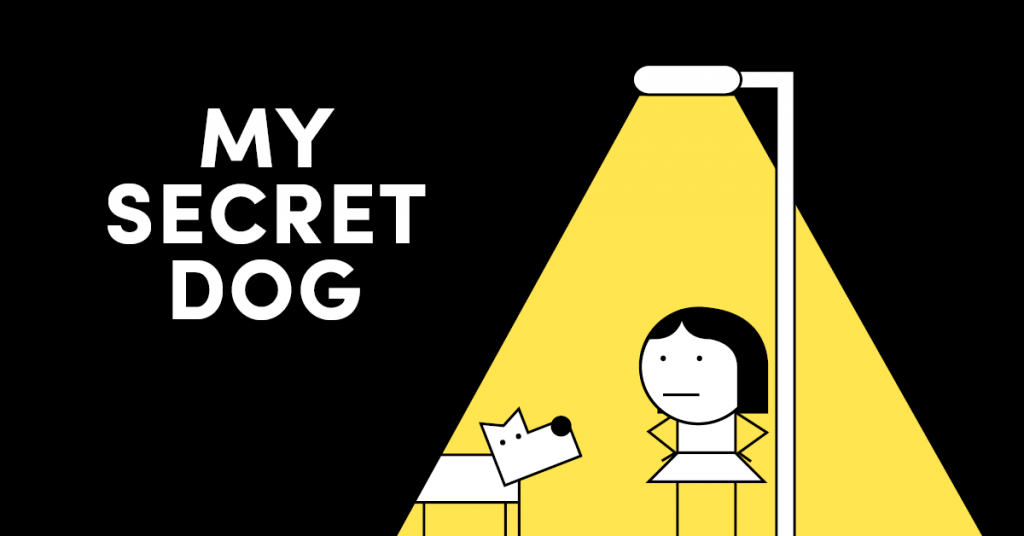
Tom Alexander explains what motivated him to write My Secret Dog and outlines the book’s positive message in promoting kindness to animals.
It wasn’t supposed to be published. Honest it wasn’t. I was just trying to get my sister a birthday present…
My sister Lois has always wanted a dog, but she lives in central London and keeping a pet is not only impractical, it’s specifically forbidden by the terms of her tenancy. (To avoid confusion, I should mention here that Lois is my older sister.) From this, I had an idea to write a story about a little girl in a similar position who goes the extra step and tries to keep a dog hidden from her mum and her teachers. I wrote it in one sitting and even though I failed all my art classes in school, I knew it needed some illustrations to break up the text. After a few terrible, terrible attempts at drawing a dog, I came up with this:

It wouldn’t win any portraiture awards, but there was no denying it was a dog. More specifically, it felt like the dog. Once I had that, the rest of the illustrations followed. Before too long, I had a collection of pages with text and pictures that I printed out, stapled together and gave to my sister on her birthday. She liked it, so I breathed a sigh of relief, put My Secret Dog in a drawer and left it there. As far as I was concerned, the folded, photocopied sheets were as much of a book as it was ever going to be.
Every now and then, I would take it out and have a look at it. I liked the story very much, and even liked the pictures (most days), but I didn’t think there was any chance of ever getting it published. Although it was a children’s book – it revolved around school and parents – I wasn’t sure if it was really a children’s book. While there was a lot of fun in the story, there were certain parts of it that felt… sad.
There’s a persistent image of children’s books being fluffy and cuddly things, full of Flopsy-Wopsy-Doo-Doos who sing songs about daydreams and toffee apples. Those stories don’t interest me now and, honestly, nor did they when I was a kid. The books I liked then showed that life wasn’t always simple. This was in line with my own life experience. Even at a young age, I knew that parents divorced, mums got ill and living on benefits was hard. (Which wasn’t to say that it was all bad. I also knew that my family loved me, Knight Rider was skill and the world was full of fantastic things that didn’t require a lot of money – library books being the number one example.)
It turns out that while the Flopsy-Wopsy-Doo-Doos of the world have their place, the children’s market is more expansive and inclusive than I ever really realised. There are all sorts of places where other kinds of stories find a home – stories that are more complex, nuanced, or deal with the sort of difficult issues that children face in real life. One of those places is Jessica Kingsley Publishers.
I came to work here as a design assistant in 2015, shepherding books through the various stages of production after an author has handed over the manuscript – namely, typesetting, revision and publication. This meant I got to see everything from dense reference works on traditional chinese medicine, to social work texts about domestic violence. The titles that always grabbed my attention, though, were the children’s books – thoughtful, engaging titles like Fiona MacDonald’s A New Day or Richy K. Chandler’s You Make Your Parents SUPER HAPPY! They dealt with difficult subjects like bereavement and divorce and still retained their distinctive authorial voices. It made me think that maybe there was a place for My Secret Dog after all. While it’s perhaps less directly issue-led than these other books, it does feel at home in their company and I’m very proud to be amongst the authors on the JKP children’s list.
I hope people like My Secret Dog. Even after all this time, I’m still very fond of that sneaky girl and her guileless mutt. It may not have all the answers for the issues it raises (secrets, responsibility, kindness to animals), but it does start a conversation. That, I think, is what good kids books are meant to do.
If you would like to read more articles like this and get the latest news and offers on our children’s books, why not join our mailing list? We can send information by email or post as you prefer. You may also be interested in liking our Special Ed, PSHE and Early Years Resources Facebook page.